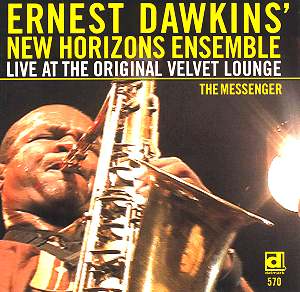Intro [0:48]
Mean Ameeen [10:49[
The Messenger [13:09]
Goin’ Downtown Blues [11:03]
Toucouleur [11:21]
The Brood [8:18]
Lookin’ for Ninny [8:25]
Maurice Brown (trumpet)
Steve Berry (trombone)
Ernest Dawkins (alto & tenor saxophone)
Darius Savage (bass)
Isaiah Spencer (drums)
The Velvet Lounge, Chicago, 14 July 2005
Ernest ‘Khabeer’ Dawkins started out playing
bass and conga drums in his early teens; later,
hearing his father’s recordings of Lester
Young and the alto playing of the legendary
Chicagoan Guido Sinclair, he fell in love
with the idea of playing the saxophone. He
studied with members of Chicago’s famous Association
for the Advancement of Creative Musicians
(he later went on to become its chairman).
He founded his New Horizons Ensemble in 1978.
Recorded here at Fred Anderson’s famous Chicago
club, the Ensemble is heard playing a characteristic
set of what it seems odd to feel obliged to
label avant-garde jazz. In truth, this is
music that draws on almost the whole of the
black music tradition, as befits the work
of a leader who has worked with, on the one
hand, AACM Big Band, Khalil El’ Zabar’s Ethnic
Heritage Ensemble and Anthony Braxton and,
on the other, with Aretha Franklin, Ramsey
Lewis, Jack McDuff and the Dells. This is
music soaked in the blues (especially on ‘Goin’
Downtown Blues’), as befits work from the
South Side of Chicago, and equally open to
the influences of bop and post-bop (Maurice
Brown’s trumpet work reminds one by turns
of Freddie Hubbard and Lester Bowie). The
theme of ‘The Messenger’ has the rhythmic
and melodic contours of Art Blakey in the
1960s, though the solos incorporate later,
and more specifically, Chicagoan idioms and
inflections.
Dawkins himself is a player whose work extends,
rather than overthrows or rebels against,
tradition. His alto playing is steeped in
the Parker tradition, but with admixtures
of Ornette Coleman and much that is his own,
producing a passionate, hard-swinging voice,
his melodic invention unafraid of sharp corners,
his tone at times fiercely biting. Steve Berry
is an inventive and eclectic soloist, in whose
work one hears echoes of many of the great
jazz trombonists; he can play with a lyricism
not always heard from modern trombonists and
he can also play some hard-driving blues.
Maurice Brown is rapidly establishing a considerable
reputation as a hard-bop trumpeter; it is
fascinating to hear him in this slightly looser
context and he is consistently impressive,
both musically and technically, playing with
a huge range of pitch and dynamics.
Fine as the front-line soloists are, they
would, I’m sure, be happy to agree that the
bedrock of this album is provided by the work
of Darius Savage and Isaiah Spencer, a brilliant
team, hard hitting but sensitive; the two
of them give something of a masterclass in
contemporary rhythm playing.
My only minor reservations are about some
rather ponderous lyrics on ‘Goin’ Downtown
Blues’. Otherwise, this is a joyous, passionate
demonstration of quite what ‘tradition’ means,
of how fully ‘present’ music looks both backwards
to its past and forwards to its possible future.
Glyn Pursglove
